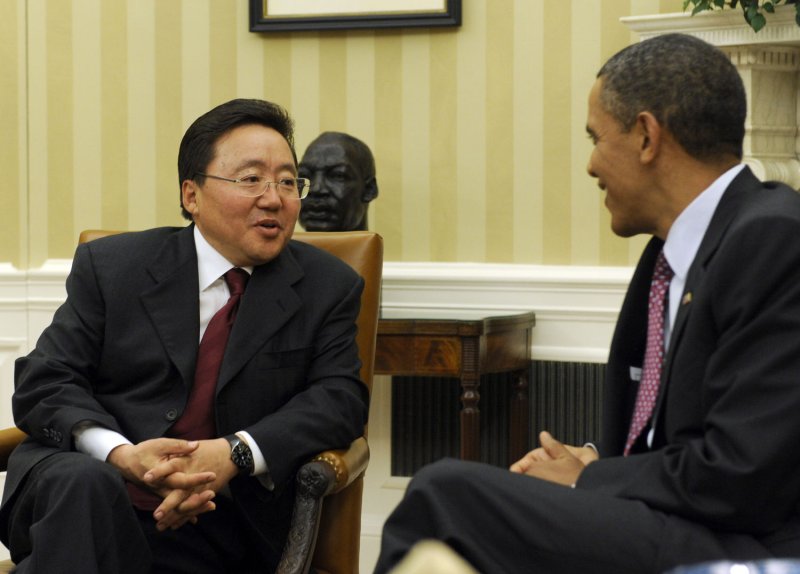U.S. President Barack Obama meets with Mongolian President Tsakhia Elbegdorj in the Oval Office of the White House in Washington, DC, on June 16, 2011. UPI/Roger L. Wollenberg |
License Photo
WASHINGTON, June 16 (UPI) -- U.S. President Barack Obama and Mongolian President Tsakhia Elbegdorj said Thursday they share common interests in promoting freedom and human rights.
The United States and Mongolia have common interests in "protecting and promoting freedom, democracy and human rights worldwide, and confirmed their intention to strengthen trade, investment and people-to-people ties so as to support economic growth and deepen the bonds of friendship between their two peoples," the two leaders said in a joint statement released after their meeting at the White House.
"Mongolia welcomed and supported the key role played by the United States as an Asia-Pacific nation in securing peace, stability and prosperity in the region," the statement said.
The two nations also have decided to "explore mutually advantageous activities in nuclear energy based on the September 2010 Memorandum of Understanding between the two countries," and the United States "applauded Mongolia's nuclear-weapons-free status."
The country known for Genghis Khan is a U.S. friend that merits increased U.S. attention, Elbegdorj said before meeting with Obama.
"Sometimes you have to pay attention to your friends," Elbegdorj told The Washington Post.
The United States, like long-ago superpower Mongolia, "has a responsibility to help those who are trying to follow in its steps," said Elbegdorj, whose market-economy nation is a parliamentary republic that holds regular elections and lets power pass peacefully between rival parties.
Vice President Joe Biden and Secretary of State Hillary Clinton are to visit the giant, landlocked, minerals-rich country bordered by Russia to the north and the China to the south, east and west.
Mongolia -- which broke free from China in 1921 but then was under heavy Soviet influence until the early 1990s -- is the 19th-largest independent and most sparsely populated country in the world, with about 2.8 million people occupying an area the size of western and central Europe combined.
The Tibetan Buddhist country is now a U.S. ally -- sending troops to support U.S. forces in Afghanistan and Iraq -- has a vibrant free press, allows street protests and does not routinely harass critics, the Post said.
"Maybe if we caused problems -- if we hid [Osama] bin Laden or atom bombs -- America would pay more attention," Elbegdorj joked.
U.S. Ambassador to Mongolia Jonathan Addleton said Mongolia -- which gets about $10 million a year in U.S. assistance -- would be "in a better place when it moves from an aid relationship to commercial relationships, as it is doing now."
Mongolia plans to buy three airplanes from Boeing Co., Elbegdorj told the Post, with the deal to be announced soon.
The World Bank recently described Mongolia's prospects for economic growth -- due in part to its rich mineral resources, including copper, coal, molybdenum, tin, tungsten and gold -- as "excellent."
"The values connection is very important," Elbegdorj said. "We have to strengthen that connection. If America invests in that, America will have many friends [in Mongolia] who live on their own, not with bombs or American troops."















